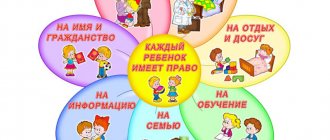The essence
The main reason is the discrepancy between social and everyday circumstances and the child’s changing needs. He wants to be an adult, he even feels like one. However, a huge number of restrictions, rules and demands from parents do not allow him to fully demonstrate independence. This causes an internal protest, which results in emotional and behavioral deviations that frighten parents so much.
The three-year crisis is characterized by the following mental neoplasms:
- primary independence;
- a new level of self-awareness;
- establishing interpersonal contacts, building new, more complex social relationships;
- volitional regulation of activity.
Developmental psychology helps to understand what is happening to a child during this period. It allows you to understand the factors that aggravate or alleviate the crisis, and gives recommendations on how parents should behave in order to prevent negative consequences.
Educational program. You can learn in detail about this period from special literature on psychology: Vygotsky “The Crisis of Three Years”, Guskova “Features of the Crisis of 3 Years in the Mental Development of a Child”, Vasilkina “What to Do if a Child Has a Crisis of Three Years?”, Abrosimova “The Age of Obstinacy. About the crisis of three years”, Filicheva “The baby is three years old”.
Consultation for parents “Three-year crisis”
Crisis of three years
. (
consultation for parents
)
Getting used to kindergarten coincides with a crisis
period in the mental development of the child.
By the age of three, parents
begin to notice serious changes in their child; he becomes stubborn, capricious, and quarrelsome.
Crisis of three years -
(Greek krisis - decision, turning point) - an age
crisis
that occurs during the transition from early childhood to preschool, characterized by a sharp and radical restructuring of existing personal mechanisms and the formation of new features of the child’s consciousness and personality, as well as a transition to a new type of relationship with others.
«Crisis of three years
“is a conventional concept in psychology, since its time boundaries are not clear and are determined in the period from the second half of the 3rd year to the first half of the 4th year.
children's lives. An age crisis
is a natural phenomenon in the development of a child’s psyche and, unlike stable periods, does not last long, about a few months, and occurs with varying degrees of severity and intensity in different children.
L. S. Vygotsky named the seven most striking features of a child’s behavior during the crisis of three years
"seven stars of symptoms." Let's look at these symptoms in more detail.
1 symptom - pronounced negativism - Forces the child to act contrary to his wishes. The child refuses to do what we ask him to do, not because he doesn’t want to, but only because he was asked to do it.
With negativism, the child acts contrary to his wishes.
When disobedient, he follows his own desire, which runs counter to the desire of an adult.
The main motive is to do not as asked, but vice versa.
Negativism is selective: the child refuses to fulfill the requests of only certain people. With others he can be obedient and flexible.
Symptom 2 - stubbornness (the child achieves his goal only because he wanted it).
A child insists on something not because he really wants it, but because he demanded it, that is, this is a reaction not to a proposal, but to his own decision.
With stubbornness, the child contradicts only because he does not want to go back on his word.
The child does things contrary to others because he said so, and he does not want to change his decisions.
Symptom 3 - obstinacy - (whims for any reason, constant dissatisfaction with everything that an adult offers). It is impersonal and not directed against a person. Obstinacy is directed against the very way of life, against the rules that were in his life until he was 3 years old.
Symptom 4 – self-will – the child wants to do everything himself, even if he doesn’t know how.
The other three symptoms are less common:
Symptom 5 - Rebellion against others - (the child quarrels with everyone, behaves aggressively). The child's behavior is of a protesting nature. The child is “at war with those around him, in constant conflict with them.” Resulting in frequent quarrels with parents
.
Symptom 6 - The child devalues the personality of loved ones - The child’s old attachments to things, to people, to rules of behavior are devalued. Expressions appear in speech that mean everything bad, negative, negative
Symptom 7 - despotism - The child tries with all his might to show power over others, he wants to achieve the position that he had in early childhood, when all his desires were fulfilled. If there are several children in a family, this symptom manifests itself in jealousy, aggression, and a demand for constant attention to oneself.
Child psychologists describing the symptoms of this crisis
, emphasize that at its center is the child’s rebellion against authoritarian upbringing, against the previously established system of relations in the family, for the emancipation of his “I”. The child increasingly says: “I myself,” which indicates a desire for independence and autonomy. During this period, the old qualities of the child’s personality are broken down and new ones emerge. “Pride in achievements” appears; the child requires approval and praise from an adult. Recognition from others changes the child's feelings - the experience of success or failure. He begins to look at himself through the eyes of another.
Parents
We should not be afraid of the severity
of the crisis
.
This is a clear manifestation of a child’s self-affirmation. And, conversely, external “ crisis-free
” behavior, which creates the illusion of well-being, can be deceptive and indicate that no corresponding age-related changes have occurred in the child’s development.
L. S. Vygotsky emphasized that behind every negative symptom of a crisis
“there is hidden positive content, which usually consists of a transition to a new and higher form.”
Positive personal acquisitions of children at this stage of development are the formation of a new level of self-awareness, the desire for independence, the development of activity, strong-willed qualities, the establishment of new and deeper relationships with adults in communication, play, cognitive and objective activities, in which the importance of a positive assessment by parents of personal achievements
, successes of children.
However, sometimes there is a crisis
three years can proceed without any obvious negative manifestations.
The opinion that this can somehow negatively affect mental development or personality formation is erroneous. In crisis
, the main thing is not how it occurs, but what it leads to. The appearance of such qualities as will, independence, and pride in achievements is a sure sign of adequate development of the child’s personality at this age stage.
Some features of the manifestation of the crisis of three years
*The period of stubbornness and capriciousness begins at approximately 18 months.
As a rule, the phase ends by 3.5-4 years. Random seizures
stubbornness in older age is also quite normal.
*The peak of stubbornness occurs at 2.5-3 years of age.
*Boys are more stubborn than girls.
*Girls are naughty more often than boys.
*During a crisis
period, attacks of stubbornness and capriciousness occur in
children 5 times a day. For some, up to 19 times!
*If children, after reaching 4 years of age, still often continue to be stubborn
and be capricious, then most likely we are talking about a “fixed”
stubbornness, hysteria, as convenient methods of manipulation
child by his parents
.
*It is not yet clear who is more stubborn - parents
, repeating all day:
“You must, you must, you need...”, or child,
stubbornly protesting against “must”, against “must”, at least
due to the fact that he simply cannot fulfill this “must” yet.
He is not ripe for many of our demands, he is only small
sprout.
How to overcome vagaries?
First you need to understand the reasons for whims and stubbornness. They may be:
Violations of the daily routine.
An abundance of new impressions.
Poor health during illness.
Overfatigue (physical and mental).
You can overcome vagaries if:
All family members will have the same requirements for the child.
They will be firm in their position and make it clear what the word “impossible” means.
They will teach the child to want, that is, to develop persistence in achieving a goal.
They will develop the child’s independence in joint activities with adults.
parents can do
:
Do not attach much importance to stubbornness and capriciousness. Take note of the attack, but don't worry too much about your child.
During an attack, stay close to him and let him feel that you understand him.
Do not try to instill anything in your child at this time - it is useless. Swearing is pointless, spanking will excite you even more.
Be persistent in your behavior with your child. If you said no, continue with that opinion.
Don’t give up even when your child has a seizure in a public place. Most often, one thing helps - take him by the hand and lead him away.
Hysteria and capriciousness require an audience, do not resort to the help of strangers: “Look, what a bad girl, ah-ah-ah!” This is all the child needs.
Try to cheat: “Oh, what an interesting toy I have (book, little thing.). “What is that crow doing there outside the window?” “Such distracting maneuvers will intrigue the capricious person, and he will calm down.”
Don't consider your child "spoiled" or "spoiled", remember that this is a natural stage of his development.
What would you do?
What if the child does not want to eat soup?
(You will beg him, Create a game situation and offer to feed the kitten or doll)
We recommend, for example, your child does not want to eat, although he is hungry. Don't beg him. Set the table and place a bear on the chair. Pretend that the bear has come for lunch and is asking the baby, like an adult, to try to see if the soup is too hot and, if possible, to feed him. The child, like a big one, sits down next to the toy and, unnoticed by himself, while playing, eats the entire lunch together with the bear.
What if the child is naughty? mother and baby in a toy store The child is trying with all his might to “persuad” his mother to buy him the toy he likes. Mom is not planning this purchase.
(You will worry about what others will think. You will show attention to the child, take him by the hand and take him to the side where the situation is calmer and try to switch his attention: “Look, what do I have?”)
You and your child are in a crowded transport, you do not have the opportunity to seat him, you are holding a heavy bag in your hands, and at this time your baby begins to scream and cry.
You are washing the dishes, the child stubbornly insists: “I do it myself,” and you know in advance that he will not do it well, and on top of that, he may break it.
Entering the room, you see that all the toys with which the child played are scattered on the floor; persuasion to collect them does not work. You feel your dissatisfaction and tension increasing.
I want to remind you that the crisis
- this is a temporary phenomenon. I wish you understanding and patience in communicating with your beloved kids.
Love your child as he is!
Causes
The main reason why children experience a crisis at age 3 is the desire for independence. By this age, they already speak well and can clearly and clearly express their desires and emotions verbally. It seems to them that this is enough to be the same as adults: eat what they eat, sit late at night watching TV, swear in bad words. Every action in this little domestic apocalypse will be aimed at achieving independence.
However, the 3-year-old crisis occurs differently for each child. Someone makes the existence of the family unbearable - endless hysterics, uncontrollable aggression, constant protests, complete depreciation of previous rules lead to serious problems. For others, the manifestations are not so vivid: isolated cases of obstinacy, sudden changes in mood, minor whims. It is noticeable that a crisis has arrived, but it is completely controllable. There are also children for whom everything goes smoothly and almost unnoticeably.
Psychologists identify a number of reasons for the intensity and brightness of the crisis of 3 years.
Authoritarian parenting style
If excessively strict norms are established in the family, unconditional submission is required, will and independence are suppressed, this results in prolonged hysterics.
Overprotection
Excessive parental care, like an authoritarian parenting style, suppresses will and independence. A child, even at 3 years old, is considered unintelligent, unviable and completely helpless. They do not allow him to take a single step without the permission of an adult. It is not surprising that the baby will prove the opposite, which will significantly complicate the problem period.
Society
The situation is often complicated due to the authoritarian parenting style or the elementary rudeness of the kindergarten teacher. The company of children with whom he plays in the yard or in kindergarten can have a bad influence on a child. Conflicts with other people force him to defend his independence even more zealously.
Intrafamily relations
The crisis is aggravated if there is a tense atmosphere within the family. Firstly, if the parents often fight or are in a state of divorce. The second psychotraumatic situation is that they are constantly busy at work and have no time to take care of the child. Problems may begin after the birth of the second baby. Childhood jealousy arises, which turns into uncontrollable outbursts of anger. In all these cases, there is a lack of attention.
But older children who participate in upbringing make the crisis easier.
Temperament
An unstable nervous system, excessive impressionability, choleric or melancholic type of temperament is another reason for the worsening crisis of 3 years.
Health status
In healthy children, the crisis period proceeds within normal limits. He is noticeable, but is kept under control by his parents. If a child develops mental abnormalities and disorders by the age of 3, the situation worsens, the manifestations are uncontrollable, vivid and explosive. In the presence of chronic diseases, genetic pathologies, or physical disabilities from birth, children are usually strongly attached to their mother and do not rebel against her. Therefore, they most often do not cause much trouble.
Adaptation to kindergarten is often cited as one of the main reasons for the 3-year-old crisis. Indeed, it is at this age that parents usually send their child to this preschool institution. But there are also children who are assigned there much earlier (from 1.5 or 2 years old). There are kids who don’t go there at all; they stay at home with their mother or grandparents. According to research, in all these cases, by the age of 3, an age crisis occurs, regardless of whether the child attends kindergarten or not and from what age.
Advice from psychologists and Dr. Komarovsky
The famous pediatrician Evgeny Komarovsky claims that the root of the problem of a child’s inappropriate behavior during the period of personality formation lies in his desire for independence. Therefore, he recommends that parents apply 3 rules in their relationship with their child at 3 years old:
- Give your child the opportunity to explore the world and understand his place in it. You should not speak only as a last resort, when the baby is in danger - you can’t go without a hat in winter, you can’t touch a hot iron, you can’t put your knitting needles in a socket.
- A unified position in the educational process. All family members must act together, since disagreements contribute to the devaluation of the authority of parents.
- If not, then always not. Once a ban has been pronounced, it must become inviolable. It is unacceptable to prohibit something to a child today, and allow it tomorrow, as long as he doesn’t whine.
Separately, Komarovsky highlights children's tantrums as a way of manipulating and subordinating adults to their will. In this case, the best position of parents is to ignore and demonstrate indifference. In the absence of a reaction to screaming and crying, such forms of manifestation of despotism quickly pass on their own.
Psychologists also give some more tips that help establish psychological contact with the child and thus mitigate the manifestations of the crisis. Among them:
- Switch the capricious baby’s attention to interesting objects, conversations, sing songs, recite rhymes. It's very distracting.
- Play with words. If the baby doesn’t want to put on a hat - “would you like a blue one or a red one?”, doesn’t want to eat - “let’s not have porridge, we’d rather eat some soup.”
- Don't force it. The baby is playing, and you need to go home to cook, eat, and clean. You should not pull the baby by the hand; ask him to accompany his mother, because you are afraid or bored to go on your own.
- Allow to make mistakes.
- Allow yourself to do some harmless mischief sometimes.
- Don't "fall in love." You should not fulfill any desires and whims of the baby. Let him get used to rejection from early childhood. But you shouldn’t suppress it either - try to find a middle ground.
- Don't compare with others.
Remember!Any comparison with other children causes a decrease in self-esteem in the child and provokes even more negativity.
- Do not use physical punishment, refuse offensive words. A child should grow up in an atmosphere of love and support. Physical violence, ridicule, and name-calling instill in a little person aggression, fear, mistrust and a negative attitude towards parents.
- Praise your child and encourage his independence.
See also:
Is it possible to carry a child in the front seat in a car seat and booster?






